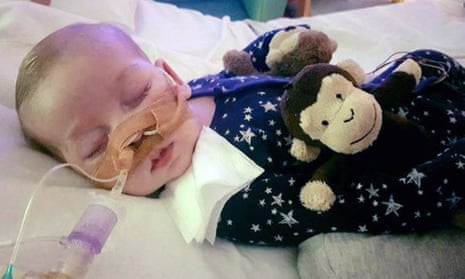Charlie Gard, the critically ill baby at the centre of a protracted legal battle, is to have his life support withdrawn by a hospital on Friday, his parents have said.
Chris Gard and Connie Yates said 10-month-old Charlie, who suffers from a form of mitochondrial disease – a genetic condition which causes progressive muscle weakness and brain damage – will die “knowing he was loved by thousands”.
In a post on Facebook on Thursday, the couple said they were spending their “last precious hours” with their son. “We’re not allowed to choose if our son lives and we’re not allowed to choose when or where Charlie dies,” they wrote.
“We and most importantly Charlie have been massively let down throughout this whole process. Charlie will die tomorrow knowing that he was loved by thousands … thank you to everyone for all your support.”
On Tuesday, the European court of human rights (ECHR) rejected Gard and Yates’s appeal that Charlie should be allowed to undergo experimental treatment in the US, closing off the last legal avenue of appeal for the family.
The judgment also lifted a court order under which doctors at Great Ormond Street hospital in London had been required to maintain life support treatment for Charlie. The hospital said it would not “rush … to change Charlie’s care” and that any alteration to his treatment would “involve careful planning and discussion”.
But the boy’s parents have condemned doctors for blocking their wish to take their son home before he dies. In a video, Gard and Yates said Charlie was not allowed to leave the hospital ward before his life support is switched off.
“We promised our little boy every single day that we would take him home,” they told Mail Online. “We want to give him a bath at home, put him in a cot which he has never slept in, but we are now being denied that,” Gard said. “We know what day our son is going to die but don’t get a say in how that will happen.”
The couple, from Bedfont in west London, also released a photograph of themselves with their son in the hospital.
“We’ve been talking about what palliative care meant,” Yates said. “One option was to let Charlie go home to die. We chose to take Charlie home to die. That is our last wish. We promised our little boy every single day that we would take him home.”
She added: “We begged them to give us the weekend. Friends and family wanted to come and see Charlie for the last time. But now there isn’t even time for that. Doctors said they would not rush to turn off his ventilator but we are being rushed.
“Not only are we not allowed to take our son to an expert hospital to save his life, we also can’t choose how or when our son dies.”
A spokesperson for Great Ormond Street Hospital for Children NHS Foundation Trust said: “As with all of our patients, we are not able to and nor will we discuss these specific details of care. This is a very distressing situation for Charlie’s parents and all the staff involved and our focus remains with them.”
Gard and Yates, who are in their 30s, launched a fundraising appeal to help pay for doctors’ bills in the US. It reached a £1.2m target before the initial high court trial and has now topped £1.3m, consisting of more than 83,000 donations.
British courts concluded that it would be lawful for the hospital to withdraw life sustaining treatment because it was likely Charlie would suffer significant harm if his suffering was prolonged without realistic prospect of improvement. The experimental therapy, the courts maintained, would produce no effective benefit.
The ECHR said it “endorsed in substance the approach” taken by the British courts and declared “the decision is final”, with European judges stating that it was “not for the court to substitute itself for the competent domestic authorities”.
British court judgments in the case had been “meticulous”, the ECHR noted.









